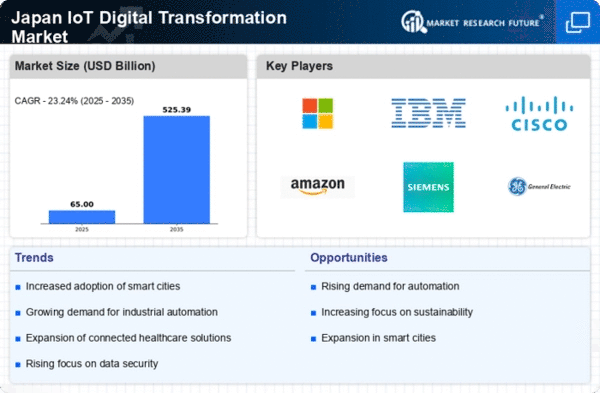Rising Demand for Automation
The increasing demand for automation across various sectors in Japan is a pivotal driver for the iot digital-transformation market. Industries such as manufacturing, logistics, and healthcare are actively seeking to enhance operational efficiency through automated processes. According to recent data, approximately 60% of Japanese manufacturers have adopted some form of automation, which is expected to rise as companies strive to reduce costs and improve productivity. This trend is likely to propel the adoption of IoT solutions that facilitate real-time monitoring and control, thereby transforming traditional operational frameworks into more agile and responsive systems. The integration of IoT technologies into automation processes not only streamlines operations but also provides valuable insights through data analytics, further driving the growth of the iot digital-transformation market.
Growing Focus on Sustainability
Sustainability has emerged as a critical concern for businesses in Japan, influencing the iot digital-transformation market. Companies are increasingly adopting IoT solutions to monitor and reduce their environmental impact. For instance, IoT-enabled smart grids and energy management systems are being implemented to optimize energy consumption and minimize waste. Recent studies indicate that organizations utilizing IoT technologies for sustainability initiatives have reported a reduction in energy costs by up to 30%. This growing emphasis on sustainable practices not only aligns with consumer expectations but also enhances corporate reputation, thereby driving the demand for IoT solutions that support environmental goals. As sustainability becomes a core business strategy, the iot digital-transformation market is likely to experience accelerated growth.
Government Initiatives and Support
The Japanese government has been instrumental in promoting the adoption of IoT technologies, which serves as a significant driver for the iot digital-transformation market. Initiatives such as the 'Society 5.0' vision aim to create a super-smart society by integrating advanced technologies into everyday life. The government has allocated substantial funding, estimated at over ¥1 trillion, to support research and development in IoT applications. This financial backing encourages businesses to invest in digital transformation, thereby fostering innovation and collaboration among various sectors. Furthermore, regulatory frameworks are being established to facilitate the safe and efficient deployment of IoT solutions, which is likely to enhance market confidence and stimulate growth in the iot digital-transformation market.
Increased Investment in Cybersecurity
As the adoption of IoT technologies accelerates, the need for robust cybersecurity measures becomes increasingly critical, serving as a key driver for the iot digital-transformation market. Japanese companies are recognizing the importance of protecting sensitive data and maintaining consumer trust. Recent reports indicate that cybersecurity spending in Japan is projected to reach ¥1 trillion by 2025, reflecting a growing commitment to safeguarding IoT infrastructures. This investment is likely to lead to the development of advanced security solutions tailored for IoT environments, thereby enhancing the overall resilience of digital transformation initiatives. As organizations prioritize cybersecurity, the iot digital-transformation market is expected to benefit from the integration of secure IoT solutions that address emerging threats.
Advancements in Connectivity Technologies
The rapid advancements in connectivity technologies, such as 5G and LPWAN (Low Power Wide Area Network), are significantly impacting the iot digital-transformation market. These technologies enable faster data transmission and improved device connectivity, which are essential for the effective deployment of IoT applications. In Japan, the rollout of 5G networks is expected to enhance the capabilities of IoT devices, allowing for real-time data processing and communication. This technological evolution is anticipated to facilitate the development of innovative solutions across various sectors, including smart cities, healthcare, and transportation. As connectivity improves, the potential for IoT applications expands, thereby driving the growth of the iot digital-transformation market in Japan.
















